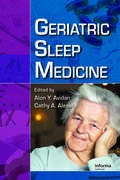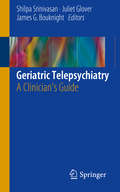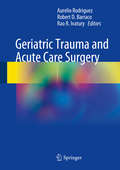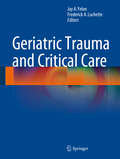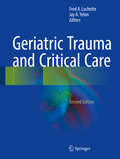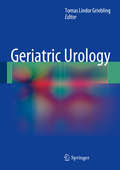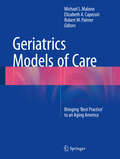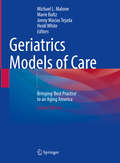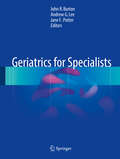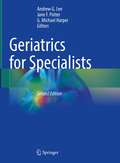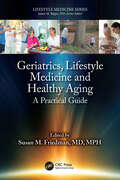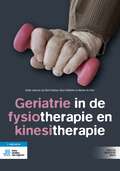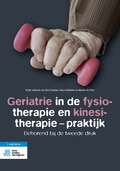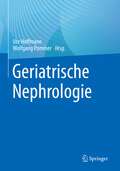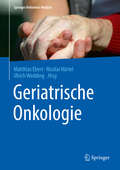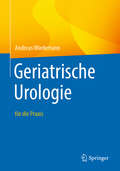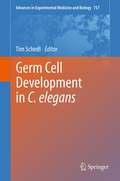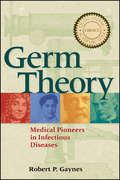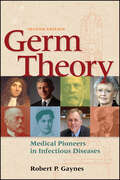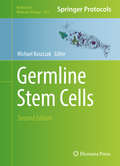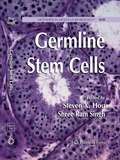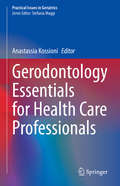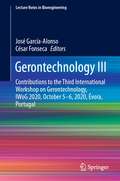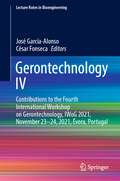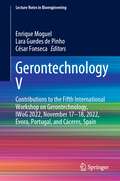- Table View
- List View
Geriatric Sleep Medicine
by Alon Y. Avidan Cathy A. AlessiGeared toward sleep specialists, neurologists, geriatricians, and psychiatrists, Geriatric Sleep Medicine presents the most current medical research for the diagnosis and management of sleep disorders in the older patient. Focused on the prevention of chronic geriatric sleep disorders, this text examines:the most recent and up-to-date classifi
Geriatric Telepsychiatry
by Shilpa Srinivasan Juliet Glover James G. BouknightThis book provides a basic introduction to geriatric telepsychiatry, including potential benefits and drawbacks of utilizing this treatment modality. The text discusses applications in academic, public, federal, and educational settings and suggests practical guidelines for implementing and maintaining a telepsychiatry program. As the elder population continues to grow over the next several decades, digital tools, including videoconferencing, will play a large role in meeting the needs of the elderly. Written by the leaders in geriatric telepsychiatry, this text is the first to focus on the psychiatric application of these digital tools, lay out the policies and guidelines for treating patients who can benefit from this service, and outline the most cutting-edge research on the topic. Geriatric Telepsychiatry is the ultimate guide for psychiatrists, geriatricians, social workers, geriatric nurses, students, long-term care facilitators, and all medical professionals who work with the elderly psychiatric patient.
Geriatric Trauma and Acute Care Surgery
by Rao R. Ivatury Aurelio Rodriguez Robert. D BarracoThe purpose of this book is to give providers of all levels a simple and essential source of practical information in treating the elderly trauma and emergency surgery patient. The Introduction instructs practitioners how to evaluate and assess risk including frailty and use this information in Goals of Care discussions to facilitate shared decision making so crucial to this population.The individual chapters consist of best practices and care guidelines from some of the most well-known thought leaders and best trauma centers in the country across the spectrum from geriatricians to trauma and acute care surgeons and nurses. Each chapter contains easy-to-read algorithms and references that the readers can use and adapt for their own setting. Chapters on Pre-hospital care will help guide EMS organizations and even systems in the right care and triage of the elderly. Each chapter also contains a Nursing Focus section for helpful nursing tips in caring for the elderly with those injuries and problems. These sections make this book a must-have for any center looking to improve its care of the elderly patient or just trying to be sure its care is already the best it can be.A special section on Post Acute Care will introduce the provider to the common issues surrounding particular disposition destinations for the elderly patient. This will facilitate discussions with families, case managers and facilities to help improve time to disposition.
Geriatric Trauma and Critical Care
by Jay A. Yelon Fred A. LuchetteGeriatric Trauma and Critical Care provides a multidisciplinary overview of the assessment and management of the elderly patient presenting with surgical pathology. By utilizing current literature and evidence-based resources, the textbook elucidates the unique nature of caring for the elderly population. The structure of the volume provides the reader with an overview of the physiologic and psychological changes, as well as the impact on the healthcare system, associated with the aging process. Emphasis is placed on the impact of aging, pre-existing medical problems, effects of polypharmacy, advanced directives and end-of-life wishes on acute surgical problems, including trauma and surgical critical care. Special attention is given to the ethical implications of management of the aged. The multidisciplinary contributors provide a unique point of view not common to surgical texts. The textbook is the definitive resource for practicing surgeons, emergency medicine physicians, intensivists, anesthesiologists, hospitalists, geriatricians, as well as surgical residents, nurses and therapists, all who care for elderly patients with surgical emergencies.
Geriatric Trauma and Critical Care
by Jay A. Yelon Fred A. LuchetteWith the expertise of an author panel of leading clinicians in the field of surgery, trauma, critical care and geriatrics the new edition of this text addresses the explosion in knowledge on the impact aging has on injury, acute illness and critical care management. The text covers the physiologic changes associated with aging, as well as the clinical assessment, stratification, and management of acute illness and injury. Furthermore, the new edition discusses the full spectrum of critical care management of the elderly. Part I explores the impact of aging on health and the healthcare system. There will be detailed discussion on the physiologic effects of aging and the impact on clinical management. The management of common surgical emergencies in the elderly is addressed in Part II. Part III addresses the evaluation and management of trauma and injury. Finally, Part IV explores the specific challenges of critical care management, including end-of-life and ethics, in the geriatric population. Updated information, reflective of the expansive literature, is addressed in all sections. New to the second edition are chapters on prehospital care, burns, nursing concerns, and abdominal solid organ injury. Appropriate chapters will include case vignettes and clinical algorithms. All chapters include a bullet-point summary. Geriatric Trauma and Critical Care, 2nd Edition will be of great value to trauma surgeons, acute care surgeons, critical care specialists, emergency medicine physicians, geriatricians, general surgeons, and trainees in surgery, critical care, and emergency medicine. Advanced practice nurses, critical care nurses, and physician assistants will also find this a useful and practical resource.
Geriatric Urology
by Tomas Lindor GrieblingGeriatric Urology outlines important topics in the care of elderly urology patients. The first section covers the biology of aging, the genitourinary system and disease screening including urologic conditions serving as warning signs of other disorders. Section two covers geriatric syndromes and urology including frailty, polypharmacy, dementia, wound healing, osteoporosis and endocrinology. Urologic conditions in older adults are explored in detail including urinary incontinence, pelvic organ prolapse, urinary tract infection, nocturia, and benign prostate diseases. Other topics covered include obtaining informed consent, development of advance directives, palliative medicine and care of the dying patient. Geriatric Urology is of great value to urologists, geriatricians, internists, residents and family practitioners.
Geriatrics Models of Care
by Michael L. Malone Elizabeth A. Capezuti Robert M. PalmerThis book describes geriatrics practice models that are used to guide the care of older adults, allowing seniors to remain at home, prevent functional disability and preserve quality of life. The models include specific interventions which are performed by health care workers to address the needs of older persons and their caregivers. These models respect patient values, consider patient safety and appreciate psychosocial needs as well. Divided into six parts that discuss hospital-based models of care, transitions from hospital to home, outpatient-based models of care and emergency department models of care, this text addresses the needs of vulnerable patients and the community. Geriatric Models of Care is an excellent resource for health care leaders who must translate these programs to address the needs of the patients in their communities.
Geriatrics Models of Care: Bringing 'Best Practice' to an Aging America
by Heidi White Marie Boltz Michael L. Malone Jonny Macias TejadaFollowing the success of the previous edition, the second edition of Geriatrics Models of Care is the definitive resource for systems-based practice improvement for the care of older adults. Several new models of care have been published in the last eight years, new outcomes have emerged to better understand the impact of existing models, and with the rise of the Age-Friendly Health Systems movement, promoting organized efforts to prepare our health care settings for older individuals is of more importance than ever. The second edition is organized based on the practice setting along a continuum of care: hospital, transitions from hospital to home, outpatient settings, and the emergency department. This book also highlights long-term care models, which is an important part of the continuum of care for older Americans. Further, this edition features models that address the needs of vulnerable populations. This new section will describe a spectrum of programs for older adults who have Alzheimer’s disease or Parkinson’s disease. Other models describe best practices for older adults undergoing surgery or those who want to remain functioning independently in their home. A defining feature of this book is that each chapter follows a standard template: 1) the challenge which led to the model; 2) the patient population served; 3) core components of the intervention; 4) the role of interdisciplinary health professionals; 5) evidence to support the intervention; 6) lessons learned in the implementation and dissemination of the model; 7) implications for family caregivers, and communities (particularly underserved and diverse communities); and 8) how each model will provide care across the continuum during an entire episode of care. In addition, each chapter features a “call out” box with practical tips for implementing the model.
Geriatrics for Specialists
by Andrew G. Lee John R. Burton Jane F. PotterThis book focuses on the circumstances that lead to the marked increasedvulnerability of seniors and are most challenging to clinicians including thepresence of multiple chronic medical conditions, variable losses ofphysiological function, and heterogeneity among individuals. Written bythe experts who lead the initiative to deliver high quality surgical andmedical care to the elderly, Geriatricsfor Specialists is the first book of its kind to provide the comprehensive knowledgespecialists and associated generalists need to deliver quality health care toseniors. With topics on important cross cutting issues like frailty,delirium and polypharmacy and specialty chapters on emergency medicine,anesthesia, many surgical and medical disciplines and rehabilitation, this book provides clinicians the knowledge and tools needed to evaluate,treat and manage the unique needs of seniors. Geriatrics for Specialists was created as a resource for specialist, generalists and allied healthprofessionals and their students and trainees who care for elderly patients.
Geriatrics for Specialists
by Andrew G. Lee Jane F. Potter G. Michael HarperThis book aims to be a single point of reference for advances in the care of geriatric populations across medical and surgical specialties. The aging population is a unique demographic with its own health challenges. Geriatricians are specifically trained to address these challenges but few medical students or residents enter geriatrics, even as the demand for geriatric expertise increases. The practices of many medical and surgical specialists are dominated by older patients who may themselves see many specialists but rarely visit geriatricians. This updated edition elucidates the most common medical conditions seen in aging patients and translates approaches to those conditions for physicians across specialties. Divided into three sections that assemble crosscutting issues, medical specialties, and surgical and related specialties, this book serves as a guide for clinicians of all backgrounds who will work with older patients as the demographic ages further.This second edition of Geriatrics for Specialists expands the number of specialist chapters to reflect growth in research in aging and clinical care for older people in dermatology, plastic surgery, and behavioral neurology. All original chapters from the first edition are extensively revised and updated to reflect the rapid growth of new knowledge in the field.
Geriatrics, Lifestyle Medicine and Healthy Aging: A Practical Guide (Lifestyle Medicine)
by Geriatrics, Lifestyle Medicine and Healthy Aging: A Practical Guide is a book for those interested in promoting healthy aging through lifestyle approaches. The book is divided into three sections covering various aspects of lifestyle medicine for older indGeriatrics, Lifestyle Medicine and Healthy Aging: A Practical Guide is a book for those interested in promoting healthy aging through lifestyle approaches. The book is divided into three sections covering various aspects of lifestyle medicine for older individuals including general concepts of lifestyle medicine practices; lifestyle “pillars” as applied to older adults; and a broad range of target conditions of importance to older adults, and how a lifestyle medicine approach may impact them. Readers gain an understanding of how lifestyle medicine and geriatrics can work together to provide a holistic approach that fosters healthy aging throughout life.Features Research-supported analysis of the relevance of lifestyle medicine in geriatric populations Evidence-based discussion of conditions that impact quality of life in older adults, including sarcopenia, incontinence, bone health, polypharmacy and falls, and how lifestyle medicine can prevent and treat such conditions Edited by a leading expert in the fields of healthy aging and lifestyle medicine in older adults As part of the Lifestyle Medicine Series edited by Dr. James M. Rippe, this book is useful to geriatric medicine clinicians who would like to increase the tools in their practice of caring for older adults; lifestyle medicine clinicians who want to understand how to effectively use lifestyle pillars to care for older adults; and anyone who is interested in their own, or a loved one’s, healthy aging.
Geriatrie in de fysiotherapie en kinesitherapie
by Dirk Cambier Hans Hobbelen Nienke De VriesDit boek geeft fysio- en kinesitherapeuten een actueel overzicht van kennis en vaardigheden om (kwetsbare) ouderen adequaat te onderzoeken en behandelen met oog voor de fysieke aspecten én voor de psychische, sociale en omgevingsfactoren.Deze tweede, geheel herziene editie van Geriatrie in de fysiotherapie en kinesitherapie bestaat uit twee delen: een boek en een online beschikbaar deel. In het eerste deel komt de kennis aan bod over de reguliere veroudering, de rol en kracht van de therapeut, en het klinisch redeneren. Ook worden de veranderingen in de grofmotorische eigenschappen beschreven (spierfunctie, mobiliteit, posturale controle en uithoudingsvermogen) en een twaalftal bijzondere aandachtsgebieden zoals onder andere dementie, vallen, hulpmiddelen en farmacotherapie.Online volgen in het tweede deel de vaardigheden op het gebied van onderzoek en behandeling. Daarin staat veelvoorkomende casuïstiek op cardiovasculair, respiratoir, orthopedisch, neurologisch en oncologisch vlak. Dit digitale deel is een heus ‘groeiboek’. Aan de basiscasuïstiek worden de komende jaren telkens nieuwe casussen toegevoegd.Het boek richt zich op fysio- en kinesitherapeuten, oefentherapeuten, ergotherapeuten en alle andere zorgprofessionals die betrokken zijn bij de zorg voor ouderen.
Geriatrie in de fysiotherapie en kinesitherapie - praktijk: Behorend bij de tweede druk
by Dirk Cambier Hans Hobbelen Nienke De VriesDit boek geeft fysio- en kinesitherapeuten een actueel overzicht van kennis en vaardigheden om (kwetsbare) ouderen adequaat te onderzoeken en behandelen met oog voor de fysieke aspecten én voor de psychische, sociale en omgevingsfactoren.Deze tweede, geheel herziene editie van Geriatrie in de fysiotherapie en kinesitherapie bestaat uit twee delen: een boek en een online beschikbaar deel. In het eerste deel komt de kennis aan bod over de reguliere veroudering, de rol en kracht van de therapeut, en het klinisch redeneren. Ook worden de veranderingen in de grofmotorische eigenschappen beschreven (spierfunctie, mobiliteit, posturale controle en uithoudingsvermogen) en een twaalftal bijzondere aandachtsgebieden zoals onder andere dementie, vallen, hulpmiddelen en farmacotherapie.Online volgen in het tweede deel de vaardigheden op het gebied van onderzoek en behandeling. Daarin staat veelvoorkomende casuïstiek op cardiovasculair, respiratoir, orthopedisch, neurologisch en oncologisch vlak. Dit digitale deel is een heus ‘groeiboek’. Aan de basiscasuïstiek worden de komende jaren telkens nieuwe casussen toegevoegd.Het boek richt zich op fysio- en kinesitherapeuten, oefentherapeuten, ergotherapeuten en alle andere zorgprofessionals die betrokken zijn bij de zorg voor ouderen.
Geriatrische Nephrologie
by Ute Hoffmann Wolfgang PommerDie „Geriatrische Nephrologie“ bildet mittlerweile einen eigenen, evidenz-basierten Schwerpunkt innerhalb der Nierenheilkunde und fokussiert somit auf die Besonderheiten der Krankheitsverläufe und der Therapiekonzepte der alten und hochaltrigen Behandlungsgruppe. Dieses Fachbuch - herausgegeben von Experten der nephrologischen Altersmedizin und einem kompetenten Autorenteam - stellt Krankheitsbilder, Diagnostik und Therapiekonzepte im nationalen und internationalen Kontext dar. Alle Kapitel sind einheitlich aufgebaut, Praxistipps geben Orientierung und Literaturangaben regen zum Weiterlesen an. Es wirbt für ein angemessenes, kooperatives Behandlungsangebot aller, die an der Betreuung älterer Menschen mit Nierenerkrankungen beteiligt sind. Ein praxisnahes Nachschlagewerk für Fachärzt*innen in der Nephrologie und Geriatrie, Weiterbildungsteilnehmer*innen der Inneren Medizin, hausärztlich tätige Internist*innen und Allgemeinmediziner*innen sowie Studierende von Pflegestudiengängen.
Geriatrische Onkologie (Springer Reference Medizin)
by Ulrich Wedding Matthias Ebert Nicolai HärtelZiel dieses Buchs ist es, die besonderen Belange alter Patienten mit Krebserkrankungen bei der Diagnosestellung, Versorgung und Therapie zusammenzufassen. Für Situationen, in denen ein standardisiertes onkologisches Vorgehen nicht angemessen scheint, erhalten behandelnde Ärzte einen fundierten Überblick über das aktuell verfügbare Wissen, um sicher den Mittelweg zwischen Über- und Unterdiagnostik sowie Über- und Untertherapie zu finden.Die Herausgeber und Autoren legen mit diesem Werk einen praktischen und umfassenden Handlungsleitfaden vor, der keine Frage offen lässt. Angesprochen sind Onkologen, niedergelassene Spezialisten, in Rehabilitationseinrichtungen Tätige sowie Hausärzte und Geriater.
Geriatrische Urologie: für die Praxis
by Andreas WiedemannTipps für eine abgestimmte Behandlung von geriatrisch urologischen PatientenDas Praxisbuch zur Urogeriatrie. Als erster Professor für Urogeriatrie Deutschlands schafft der Autor den Transfer von hilfreichen Erkenntnissen aus der Geriatrie in die Urologie und umgekehrt. Die Zunahme älterer, multimorbider Patienten ist in der Urologie besonders stark. Inkontinenz ist eines der führenden Leiden im höheren Lebensalter. Fachübergreifend, auf der Basis der aktuellen Wissenschaft und einer jahrelangen Erfahrung aus Klinikpraxis und Forschung, werden relevante Aspekte der Geriatrie, die bei der Behandlung multimorbider, urologischer Patienten berücksichtigt werden sollten, übersichtlich und praxisnah erläutert. Dazu zählen Themen wie: Einbinden geriatrischer Assessments in die urologische Diagnostik Einbeziehung der geistigen und körperlichen Ressourcen in die Therapieentscheidung Nebenwirkungen und Wechselwirkungen urologischer Präparate Polypharmazie Demenz und andere Komorbiditäten Kognitive Veränderungen nach einer urologischen Operation Jedes Kapitel enthält Tabellen und Entscheidungshilfen, die es dem Leser erlauben, schnell die wichtigsten Punkte für den geriatrischen Patienten zu prüfen. Für alle Urologen, aber auch Allgemeinmediziner, Internisten, Geriater, die diese Patientengruppe, die eine ganzheitliche Behandlung verfolgen.Das Buch entstand in Zusammenarbeit mit dem Arbeitskreis Geriatrische Urologie. Es möchte durch den fachübergreifenden, interdisziplinären Blick, ein Überdenken standardisierter Therapien anregen.
Germ Cell Development in C. elegans
by Tim SchedlGerm cells in sexually reproducing metazoa, through the germline lineage, are the route by which genetic material and cytoplasmic constituents are passed from one generation to the next in the continuum of life. Chapters in this book review germ cell development in the model organism Caenorhabditis elegans, discussing the biology, the genetics and the molecular mechanisms for various processes, as well as drawing comparisons with other organisms. Processes discussed include specification of germ cell fate, meiosis, gametogenesis, environmental/ physiological controls, epigenetics and translational control, fertilization and the oocyte-to-embryo transition. This book thus provides a comprehensive picture of the germline lineage and the continuum of life for the worm.
Germ Theory: Medical Pioneers in Infectious Diseases (ASM Books)
by Robert P. GaynesFrom Hippocrates to Lillian Wald—the stories of scientists whose work changed the way we think about and treat infection. Describes the genesis of the germ theory of disease by a dozen seminal thinkers such as Jenner, Lister, and Ehrlich. Presents the "inside stories" of these pioneers' struggles to have their work accepted, which can inform strategies for tackling current crises in infectious diseases and motivate and support today's scientists. Relevant to anyone interested in microbiology, infectious disease, or how medical discoveries shape our modern understanding
Germ Theory: Medical Pioneers in Infectious Diseases (ASM Books)
by Robert P. GaynesGerm Theory: Medical Pioneers in Infectious Diseases,SECOND EDITION From the ancient worlds of Hippocrates and Avicenna to the early 20th century hospitals of Paul Ehrlich and Lillian Wald to the modern-day laboratories of François Barré-Sinoussi and Barry Marshall, Germ Theory brings to life the inspiring stories of medical pioneers whose work helped change the very fabric of our understanding of how we think about and treat infectious diseases. In beautifully crafted narratives, author Robert Gaynes describes and presents compelling stories, including How Edward Jenner, the pioneer of vaccination, faced down scores of naysayers How a chance discovery led Louis Pasteur to the idea that the virulence of microbes can be altered How scientists in France, the Netherlands, and Denmark produced penicillin during World War 2 while keeping their efforts hidden from the Nazis The second edition features three new chapters based on interviews with Nobel Laureates François Barré-Sinoussi and Barry Marshall, and former NIAID Director and medical advisor to seven U.S. presidents Anthony Fauci, detailing fascinating accounts from their careers, including their groundbreaking work in the areas of HIV, peptic ulcers, and COVID-19, respectively. Winner of a CHOICE Outstanding Academic Title award for its first edition, Germ Theory is required reading for anyone training or working in the field of infectious diseases or with an interest in microbes, the history of medicine, or how new discoveries can bring about paradigmatic shifts in thinking.
Germline Stem Cells
by Michael BuszczakThis second edition provides updated and new chapters on selected genetic, molecular, biochemical, and cell biological techniques. Chapter's guide readers through methods and principles on primordial germ cells and germline stem cells, however many of these principles can be applied to different types of adult stem cells. Written in the highly successful Methods in Molecular Biology series format, chapters include introductions to their respective topics, lists of the necessary materials and reagents, step-by-step, readily reproducible laboratory protocols, and tips on troubleshooting and avoiding known pitfalls. Authoritative and cutting-edge, Germline Stem Cells: Second Edition aims to present the new findings and techniques that have developed since the first edition.
Germline Stem Cells
by Shree Ram Singh Steven X. HouIn this comprehensive and cutting-edge book, leading experts explore the parameters that define germline stem cells and the mechanisms that regulate the cell behavior in order to better isolate, characterize and maintain them. The volume begins by providing protocols for germline stem cell identification and regulation in model organisms, and concludes with detailed chapters covering current techniques involving in vitro culture and the applications of the cells.
Gerodontology Essentials for Health Care Professionals (Practical Issues in Geriatrics)
by Anastassia KossioniThis book provides basic knowledge and skills for non-dental healthcare practitioners, helping them recognize the importance of oral health, perform initial oral health assessments, consult dentists when necessary, and offer preventive advice and counseling. As people age, they tend to refrain from routine dental care, while the number of consultations with non-dental healthcare providers (physicians, nurses, pharmacists, physician assistants, physical therapists, occupational therapists etc.) increases. However, few healthcare providers are adequately trained to assess oral problems. The relevance of this book is underscored by the recently published European policy recommendations on oral health in older adults by the European College of Gerodontology and the European Geriatric Medicine Society, which highlight the importance of the active involvement of non-dental primary care practitioners in oral health assessment and promotion. These two respected European Societies have identified a significant gap in education, practice and health policies and described the necessary action plans. This book helps to fill the educational gap identified in the recommendations and will be an invaluable tool for all healthcare providers working with older people.
Gerontechnology III: Contributions to the Third International Workshop on Gerontechnology, IWoG 2020, October 5-6, 2020, Évora, Portugal (Lecture Notes in Bioengineering)
by José García-Alonso César FonsecaThis book gathers revised selected papers from the 3rd International Workshop on Gerontechnology, IWoG 2020, held on October 5-6, 2020, in Évora, Portugal. They reports on cutting-edge technologies and optimized workflows for promoting active aging and assisting and elderly people at home, as well as in healthcare centers. It discusses the main challenges in the development, use and delivery of health care services and technologies. Not only they proposes solutions for improving in practice the monitoring and management of health parameters and age-related diseases, yet they also describes improved approaches for helping seniors in their daily tasks and facilitating their communication and integration with assistive technologies, thus improving their quality of life, as well as their social integration. The book provides health professionals, researchers, and service providers with extensive information on the latest trends in the development and practical application of gerontechnology in elderly care.
Gerontechnology IV: Contributions to the Fourth International Workshop on Gerontechnology, IWoG 2021, November 23–24, 2021, Évora, Portugal (Lecture Notes in Bioengineering)
by José García-Alonso César FonsecaThis book gathers peer-review contributions to the 4th International Workshop on Gerontechnology, IWoG 2021, held on November 23-24, 2021, in Évora, Portugal. They report on cutting-edge technologies and optimized workflows for promoting active aging and assisting elderly people at home, as well as in healthcare centers. They discuss the main challenges in the development, use and delivery of health care services and technologies. Not only they propose solutions for improving in practice the monitoring and management of health parameters and age-related diseases, yet they also describe improved approaches for helping seniors in their daily tasks and facilitating their communication and integration with assistive technologies, thus improving their quality of life, as well as their social integration. All in all, this book provides health professionals, researchers, and service providers with extensive information on the latest trends in the development and practical application of gerontechnology, with a special emphasis on improving quality of life of the elderly.
Gerontechnology V: Contributions to the Fifth International Workshop on Gerontechnology, IWoG 2022, November 17–18, 2022, Évora, Portugal, and Cáceres, Spain (Lecture Notes in Bioengineering)
by César Fonseca Enrique Moguel Lara Guedes de PinhoThis book gathers peer-review contributions to the 5th International Workshop on Gerontechnology, IWoG 2022, held on November 17-18, 2022, in Évora, Portugal, and in Caceres, Spain. They report on cutting-edge technologies and optimized workflows for promoting active aging and assisting older adults at home, as well as in healthcare centers. They discuss the main challenges in the development, use and delivery of health care services and technologies. Besides proposing solutions for improving monitoring and management of health parameters and age-related diseases, the chapters also describe approaches for helping seniors in their daily tasks and facilitating their communication and integration with assistive technologies. All in all, this book provides health professionals, researchers, and service providers with extensive information on the latest trends in the development and application of gerontechnology, with a special emphasis on improving quality of life and social integration of the elderly.
